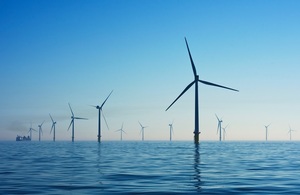COP26: Scottish businesses among those leading world to net zero
Major Scottish businesses SSE, Royal Bank of Scotland/Natwest and Abrdn, have committed to eliminating their contribution to carbon emissions by 2050.

As the world gathers together at the UN COP26 climate summit, the UK Government is calling on the global private sector to follow the UK’s example and join the UN Race to Zero.
Scotland’s largest businesses are among those across the UK leading the way in the global transition to net zero emissions. SSE, Royal Bank of Scotland/Natwest and Abrdn are part of a group of FTSE 100 businesses committing to eliminating their contribution to climate change by 2050.
As of today, 60 of the UK’s FTSE 100 companies have signed up to the United Nation’s Race to Zero campaign – the largest ever global alliance committed to achieving net zero carbon emissions by 2050 at the latest, backed by independent experts and organisations to ensure everyone in the Race is following through on meeting their targets – signally a strong shift in the UK economy to a greener future.
Accelerating momentum from UK businesses means that pledges have more than quadrupled since November last year, now representing total market capital of over a trillion pounds and combined turnover of £700 billion.
Business and Industry Minister Lee Rowley said:
Businesses both large and small, across all sectors of the global economy, have a crucial role to play in both reducing their environmental impact and developing the green technologies that will set us on the path to net zero.
With over 2,500 UK companies joining the Race to Zero, including the majority of our largest firms, the UK is leading the way in showing how going green doesn’t just make sense for the planet - it makes business sense too.
UK Government Minister for Scotland Malcolm Offord said:
It’s impressive news that some of Scotland’s largest and best-known businesses are leading by example on the journey to net zero.
“This shows once again that business growth can go hand-in-hand with tackling climate change, creating jobs and boosting the economy while supporting a greener future.”
As part of its net zero pledge, Perth-headquartered energy company SSE is investing £7.5billion in low-carbon energy and electricity projects, including backing Scotland’s largest windfarm off the coast of Angus, and one of Europe’s most productive onshore windfarms on the Shetland Islands.
SSE CEO Alistair Phillips-Davies said:
The UK has decarbonised its power sector more rapidly than any developed economy since the landmark Climate Change Act was passed in 2008 and as the UK’s clean energy champion we’re delighted to have played our part in that.
Setting bold targets for the future is all well and good, but they need to be followed up with action – and that’s what the Race to Zero is all about. We’re building more offshore wind than anyone on the planet and ramping up our investment in decarbonising technologies to help accelerate the net zero transition. We hope to see more companies setting target but also delivering the urgent action needed to address the climate crisis.
Also announced today, over 2,000 small businesses from across the UK have pledged to reduce their emissions and join the Race to Zero through the Together For Our Planet Business Climate Leaders campaign, which was launched by the Prime Minister earlier this year to help small businesses go green.
Taking action on climate change will help businesses grow, seize new opportunities, create new jobs, encourage investment and adapt against the challenges of a changing planet, while reducing emissions can lower businesses’ running costs, save them money and attract new customers – ultimately helping them maintain a competitive advantage locally and globally.
The commitments build on the government’s recently published Net Zero Strategy, which outlines measures to transition to a green and sustainable future, helping businesses and consumers to move to clean power, supporting hundreds of thousands of well-paid jobs and leveraging up to £90 billion of private investment by 2030.